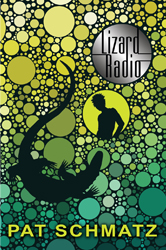 “I do not believe.” So begins Pat Schmatz’s new YA novel Lizard Radio (September 8, 2015, Candlewick Press). It is a perfect first line for a book largely about belief – belief in one’s self, belief in a government and its proscribed ways, belief (or trust) in others, and belief in things that you can hardly believe are real.
“I do not believe.” So begins Pat Schmatz’s new YA novel Lizard Radio (September 8, 2015, Candlewick Press). It is a perfect first line for a book largely about belief – belief in one’s self, belief in a government and its proscribed ways, belief (or trust) in others, and belief in things that you can hardly believe are real.
In a futuristic society run by a controlling Gov, fifteen-year-old Kivali — a bender teen in a gender-rigid society — has struggled to find her place. With adulthood approaching, she will have serious choices to make, choices that are almost entirely about belief.
Abandoned as a baby, Kivali has been raised by ardent nonconformist Sheila, who has told her fantastical stories about where she comes from. And while others ask Kivali is she is a boy or a girl, she herself wonders if she is human or lizard, neither or both, hungering for the “lizard radio” only she seems to be able to hear. But now Sheila has deposited her into the grasp of the Gov-controlled CropCamp, where she is supposed to learn to be an obedient and contributing member of society – and a strictly gendered one. While Kivali struggles with the schedules and regs at CropCamp, she also makes the first real friends she’s ever had. But when strange things start happening, and Kivali has to decide whether to conform or risk rebellion, those friendships complicate and confuse her.
Lizard Radio is an engaging and fast-paced story, not quite science fiction, not quite dystopia, but futuristic and with all the moral ambiguity and questions about conformity often present in both genres. And for deeper readers, it will raise weighty questions about identity, leadership, societal good, social constructs, and who defines, or gets to define, who we are or what we believe.
I’m thrilled to be able to share this interview with Pat Schmatz about Lizard Radio:
E. M. Kokie: Kivali lives in a world in which being transgender is recognized, and transition is encouraged and state supported, but being gender fluid is not accepted. I found that dichotomy interesting. I wondered how much you saw that cultural construct of gender different than our constructs of gender, similar to our constructs, where we are headed, etc.
Pat Schmatz: In the writing of Lizard Radio, I was very interested in dichotomies. I found myself often thinking of a couple of passages from A Wrinkle in Time:
“Meg has it tough,” Charles Wallace said. “She’s not really one thing or another.”
And later:
“Mother,” Meg pursued. “Charles says I’m not one thing or the other, not flesh nor fowl nor good red herring.”
Those fictional conversations have stuck with me through the years, and in the process of writing Lizard Radio I thought about them many times.
I believe it’s easiest for people (and even more so for governments and organizers) if everyone is easily categorized. I watch myself do it all the time. I run into someone new and my brain immediately wants to label and box them so I can decide who they are in relation to me and how I should therefore respond to them. Even as I’m doing it, I understand the loss that comes with that kind of rapid categorization, for the boxer as well as the boxed.
In terms of gender, it’s been a delight to see the gradual opening of people’s minds around the ideas of transgender and transition. And still, I notice that people want to know, “what are you really?” – referring to whatever their definition of “really” is – biology, genetics, or legal paperwork. Like the gov in Lizard Radio, it’s easier to accept that someone started out with the wrong assignment and put them in the right one than it is to accept fluidity, both/neither, all and none.
So that’s my very long answer – I’m not sure where we’re headed, but I am most interested in fluidity and flexibility. Not just around gender, but around many other constructs as well. Social constructs and identifiers are useful in broad strokes and often essential in terms of understanding privilege and social justice, but when tightened down on individuals across contexts, they are almost always limiting.
E.M.K.: Lizard Radio not only explores themes of gender identity, but also the theme of leading versus following, and issues of power and self-determination. What inspired some of the controlling and hyper-conformist aspects of the government in Lizard Radio?
P.S.: I guess you could say I was inspired by my parents on this one. Or maybe my parents’ generation’s idea of “good behavior.” In particular, I was inspired by my own childhood and teen experiences of constantly fighting those behavioral expectations. In one iconic moment – I think I was around 14 – my mother threw up her hands in frustration and said, “Can’t you just please, for once in your life, do what everyone else does and not make a thing of it?”
I did as she asked in that moment, and in other moments as well, and those are not the moments I’m proud of. They are the moments that I folded, I disregarded my own developing sense of ethics and integrity, and took the easy way out. Those were my most un-Lizard moments.
As I got to know Kivali, and understood the kind of support she got from Sheila and Korm – the ways they nurtured her sense of trust in her own experience – I was able to write her as the person I wish I could have been. It was like getting a chance to go back and take a different road at those decision points. One of my favorite parts of writing is to give characters the resources to follow the best path under challenging circumstances, and then see if they do it. Kivali did, and I’m better for knowing her.
E.M.K: And as a follow up, Kivali and her friends are aware of injustices or things about their world that they don’t like or trust, and they are faced with choices that can impact their futures. Were you thinking about adolescent activists in our world when you were exploring these themes?
P.S.: Mostly, I was drawing on my own activist experience. Although none of my characters are based strictly on one person, they’re all fusions of people I know and with whom I’ve worked in political movements or creative community. Sully, Nona, Emmett, Tylee, Rasta, Donovan, Sabi – they are all personalities and styles that I know well and for which I have great fondness and respect.
I’ve done a lot of consensus-based decision-making and it’s fascinating to watch these different types of leaders and followers and mavericks throw in together and eventually emerge with a plan of action. I’ve seen some terrific work coming from younger activists in the past few years and it’s been exciting and inspiring to see them do better than we did. I guess Kivali and her friends reflect both the shortcomings of my generation of activists and my hopes for those on the rise.
E.M.K.: Why “lizard” radio? What drew you to lizards, real or imaginary?
P.S.: You know, I still don’t know why “lizard.” The book started with a sketch of a little lone lizard wearing headphones with a cord that went to nowhere, searching desperately for a signal. Even after all of my study of lizards, lizard symbolism, metaphysical and iconic lizard information – I don’t know. But I kept going back to the lizards, and about three drafts through I discovered the middle grade novel Lizard Music by Daniel Pinkwater. I was astounded by how many overlapping ideas we had, and decided I must be on some right track that I just didn’t (and still don’t) understand.
E.M.K.: Lizard Radio is your fifth published novel for adolescent readers. Are there themes or ideas you find yourself returning to again and again?
P.S.: I do have a few themes that keep coming up over and over again. “Trust your own experience – it’s the only truth you’ll ever know.” – That’s a direct quote from my first novel, Mrs. Estronsky and the UFO. That idea pops up over and over again. The other recurring theme I’m aware of is feeling different, on the outside, unable to fit in anywhere but still seeking connection. I guess those are the things I’m trying to teach myself this time around. Maybe if I write about them enough, I’ll finally get them.
Thanks, Pat! Here’s wishing Lizard Radio a far-flying launch into the hands of eager readers.
Pat grew up in rural Wisconsin and has lived in Michigan, California, and Minnesota. In addition to writing, she’s interested in language study (ASL, Italian, Japanese and Spanish), drawing/cartooning, travel and anything outdoors. She occasionally teaches writing on-line and in person, and is always happy for a chance to visit a middle school or high school classroom. Her #1 favorite hobby, relaxation and adventure has been the same since she was little – stories. Stories in books, music, art, dance – it’s all about the story.
